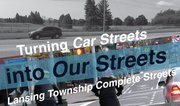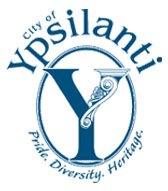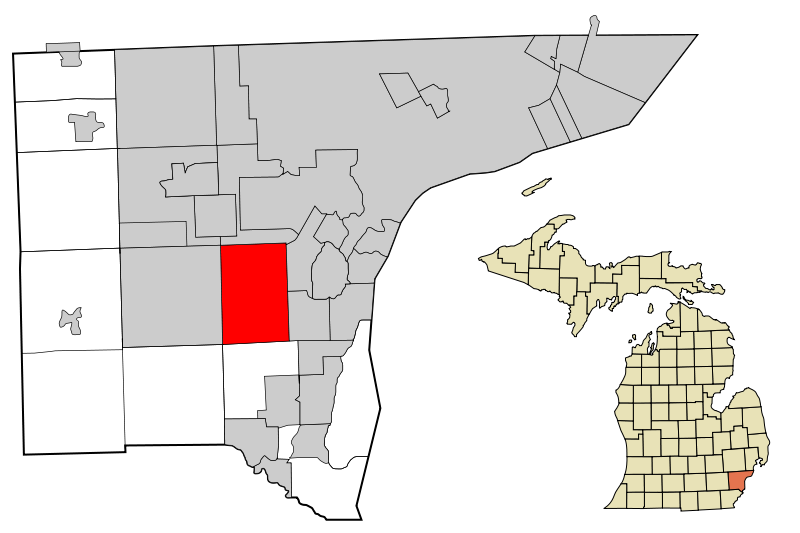You are currently browsing the tag archive for the ‘Ordinance’ tag.
 As a result of planning efforts for “Complete Streets,” the City of Lathrup Village has adopted an ordinance that will help facilitate future street, bike facility, and sidewalk improvements.
As a result of planning efforts for “Complete Streets,” the City of Lathrup Village has adopted an ordinance that will help facilitate future street, bike facility, and sidewalk improvements.
With assistance of Lathrup Village‐based Birchler Arroyo Associates, Inc., a Michigan planning firm that specializes in downtown planning and transportation consulting, the City Council and Planning Commission have been developing a Non‐Motorized Transportation Plan (NMTP), a Non‐Motorized Transportation Improvement Program (TIP), and a Complete Streets Ordinance. The purpose of these efforts is to guide the planning, design, construction and reconstruction of roadways, sidewalks, bicycle paths, and other transportation facilities, making them “Complete Streets.”
Recent legislation adopted in Michigan provides a method for achieving “Complete Streets” in communities across the state. “Complete Streets” is a relatively new term that describes a transportation network that provide safe and efficient access to users, whether they travel by car, truck, transit, assistive device, foot, or bicycle. In Lathrup Village, plans for street and sidewalk repairs are made annually. However, the City recognized the need to address non‐motorized transportation more fully and with an emphasis on improving the connectivity in and around the entire City, despite the physical boundaries of Southfield Road and I‐696, which bisect the City from east to west, and north to south, respectively.
The Reverend Oscar King III, a Lathrup Village Planning Commissioner, sums up the “Complete Streets” planning efforts by noting, “In my sense, it redefines Lathrup Village so that it becomes something more than somewhere people drive through, getting to somewhere else. It becomes a destination, a wellplanned destination, that can respond to what was, what is, and allow us to plan for the future.”
Birchler Arroyo Associates Inc. vice‐president Rod Arroyo agrees, “With the Complete Streets Ordinance, the City is taking a big picture approach to creating a complete transportation network for its residents and businesses. “ The new ordinance will require the City to consider how improvements can be made to the non‐motorized transportation network when other types of public infrastructure projects are undertaken.
The Planning Commission is holding a public hearing on the Complete Streets‐Non‐motorized Transportation Plan on November 8 and anticipates that the plan will be adopted as an amendment to the City’s Master Plan by December.
Download the Lathrop Village Complete Streets ordinance
*********
Lathrup Village, Michigan is in a highly desirable location in southern Oakland County. Conveniently located off I‐696, the City is within easy reach of the areas major cities and destinations. It has a population of over 4,500 and covers 1 1/2 square miles. The majority of its commercial uses are located on Southfield Road, an important north‐south arterial. Jeff Mueller is the City Administrator. Birchler Arroyo Associates, Inc. is a planning and transportation consulting firm located in Lathrup Village, MI. Since 1989, Birchler Arroyo Associates, Inc., has been a leader in community planning and transportation consulting in southeast Michigan. The firm’s award‐winning plans and tools have been recognized at the state and national levels for planning excellence. For more information on Birchler Arroyo Associates, Inc., please contact Rod Arroyo at 248.423.1776 or visit their website: www.birchlerarroyo.com
 On September 13, 2011, Lansing Township passed a Complete Streets ordinance in order to promote the public health, safety, comfort, convenience, and general welfare for walking, bicycling, and public transportation and to encourage increased use of these modes of transportation as part of daily activities, while at the same time securing adequate traffic circulation to the roadways, streets and highways to achieve the maximum utility and livability on individual parcels. Lansing Township became the ninth community in Michigan to adopt a Complete Streets ordinance, but the first township to do so in the state.
On September 13, 2011, Lansing Township passed a Complete Streets ordinance in order to promote the public health, safety, comfort, convenience, and general welfare for walking, bicycling, and public transportation and to encourage increased use of these modes of transportation as part of daily activities, while at the same time securing adequate traffic circulation to the roadways, streets and highways to achieve the maximum utility and livability on individual parcels. Lansing Township became the ninth community in Michigan to adopt a Complete Streets ordinance, but the first township to do so in the state.
Because townships do not own their roadways and must work with and through county road commissions and the Michigan Department of Transportation to implement roadway projects, the ordinance is unique.
The Township committed to approaching every transportation project and program as an opportunity to collaboratively implement Complete Street practices and infrastructure in order to improve public and private streets and the transportation network for all users. It also recognizes public investments by prioritizing Complete Streets projects that are located near public service areas (e.g., schools, government facilities, libraries, public health facilities, parks, hospitals, etc.) and that provide improved access to healthy food (e.g., farmers markets, full service groceries, community gardens, etc.). The Township recognizes that not all modes of travel are appropriate on all streets and therefore outlines specific exceptions. The Township also has a detailed plan for collecting data and measuring the impact of their Complete Streets ordinance and projects.
This ordinance comes after a year-long process of exploring the benefits of Complete Streets and approaches to implementation with partners such as the Ingham County Health Department and Tri-County Regional Planning Commission. Lansing Township is also currently developing its non-motorized transportation plan which will help to implement the Complete Streets ordinance.
 By Bob Krzewinski, Chair of the City of Ypsilanti Non-Motorized Advisory Committee
By Bob Krzewinski, Chair of the City of Ypsilanti Non-Motorized Advisory Committee
Over the summer of 2011, the City Council of the City of Ypsilanti voted on, and approved, a Complete Streets ordinance, becoming the 8th Michigan community to locally put Complete Streets into law. The Ypsilanti Complete Streets ordinance takes effect on September 17th, thirty days after the last of two required votes by City Council.
Complete Streets policies ensure that when roads are constructed, or rebuilt, they are designed and operated to enable safe access for all users. Pedestrians, bicyclists, motorists and transit riders of all ages and abilities can move safely along and across a Complete Street. They improve public safety and reduce crashes by providing dedicated pedestrian and bicycle infrastructure, such as safe crosswalks, sidewalks and on-road bicycle facilities such as bike lanes and sharrows.
Complete Streets also have an extra benefit in that they tend to boost local economies by increasing residential property values. Demand for walkable communities is growing across the country and home buyers are often willing to pay a premium to live in areas where they can safely walk and bike. Businesses located along Complete Streets corridors also often report increased sales after pedestrian, bicycle and transit facilities are installed.
Complete Streets also promotes public health by making it safe and convenient for children and families to incorporate physical activity into their daily lives. With Michigan’s rampant obesity epidemic, Complete Streets provides a golden opportunity to replace our crumbling transportation infrastructure with safe and convenient active transportation options.
By passing a Complete Streets ordinance, the City of Ypsilanti joins scores of communities across Michigan that are embracing Complete Streets, including Washtenaw County neighbors in Saline, Dexter and Ann Arbor.
With rising gasoline prices, more and more Michigan residents are walking and bicycling for both transportation and recreation. Complete Streets ordinances, such as recently enacted by the City of Ypsilanti, will certainly help make such activates not only more possible, but easier and safer.
Download Ypsilanti’s Complete Streets ordinance here.
 Taking a major step toward ensuring its streets, sidewalks and pathways are as safe, welcoming and functional as possible for all types of users, the City of Williamston has passed a Complete Streets ordinance, becoming the 7th Michigan community to do so. Adopted unanimously by the City Council at its June 12 meeting, the ordinance calls for a number of next steps, including that the City develop a Comprehensive Non-Motorized Transportation Plan to be incorporated into the City’s Master Plan when it is revised in 2012.
Taking a major step toward ensuring its streets, sidewalks and pathways are as safe, welcoming and functional as possible for all types of users, the City of Williamston has passed a Complete Streets ordinance, becoming the 7th Michigan community to do so. Adopted unanimously by the City Council at its June 12 meeting, the ordinance calls for a number of next steps, including that the City develop a Comprehensive Non-Motorized Transportation Plan to be incorporated into the City’s Master Plan when it is revised in 2012.
“This Complete Streets ordinance is the first step toward creating an even better experience for all those who travel in or through Williamston, whether they do so on foot or bike, or in a wheelchair, car or some other mode of transportation,” said Michael Gradis, Associate Planner for McKenna Associates and staff planner for the City of Williamston. “The positive effects of this ordinance will be seen very soon and yet last for generations.”
Among other things, the Complete Streets ordinance will help create better links between destinations within the City, including Williamston Schools, the commercial downtown and McCormick Park, Williamston Industrial Park, and newly constructed neighborhoods. The Non-Motorized Transportation Plan will also propose connections to surrounding communities.
With input from Williamston’s Department of Public Works and Police Department, Gradis and McKenna Principal Planner Greg Milliken, AICP, approached City Council about the merits of Complete Streets and drafted the ordinance that was eventually adopted.
The City has discussed a number of initiatives in conjunction with recent downtown streetscape and park improvements—all focused around the idea of “placemaking,” a term used to describe the process of creating spaces that are pleasurable, interesting and useful for new or existing users.
“By improving existing non-motorized infrastructure and expanding the non-motorized network throughout the City, we hope spaces once skipped over or not enjoyed will be reclaimed—particularly by new non-motorized users,” said Milliken.
Working for the City of Williamston, Gradis and Milliken have already begun drafting the Comprehensive Non-Motorized Transportation Plan and will soon conduct a series of brainstorming sessions with elected officials, other staff and the public.
By enacting the Complete Streets ordinance, Williamston has moved closer to its goals of encouraging healthy, active living; improving non-motorized mobility options; and improving the safety and quality of life of all its residents.
Download Williamston’s Complete Streets Ordinance
For more information:
Michael Gradis
Associate Planner, McKenna Associates
Staff Planner, City of Williamston, MI
248.596.0920
[email protected]
###
Marquette Township, Ispeming and Oakland Township adopt complete streets resolutions.
Holland, East Lansing and Lansing Township close.
First meeting scheduled for Complete Streets Advisory Council.
Complete streets continues to gain momentum around the state. Last week, two Upper Peninsula communities, Marquette Township and the City of Ishpeming both passed Complete Streets resolutions. “Marquette Charter Township has been a leader in providing for the health, safety, welfare, and ease of mobility for those preferring non-motorized modes of transit. In 2003 our Planning Commission required that all new or substantially reconstructed roads must provide an adjacent non-motorized alternative. So, moving forward with the Complete Streets process was a natural for us,” said Randy Girard, Township Manager for the Charter Township of Marquette.
We have learned that the City of Marquette is also working on a policy and should be bringing it before City Council within a month or two. When passed this would make three policies withing Marquette County. Our hats off to our partners at the Marquette County Health Department for all their great leadership in moving these policies forward.
According to the Oakland Township Patch, the Oakland County Board of Trustees voted last night to pass a resolution “supporting Michigan Complete Streets program.” We have not seen the actual language of the resolution yet, but are honored to have the official endorsement of the Board of Trustees for our work to advance complete streets across the state. We look forward to working with the Township in helping to advance their efforts to safely accommodate all roadway users.
Oakland Township becomes the second Oakland County township, after Milford Township, to adopt a Complete Streets resolution. As with Milford Township, Oakland Township does not have jurisdiction over roads. It is the Road Commission for Oakland County who owns, builds, and maintains them within the county. The Complete Streets state law passed last August, however, does state that a “county road agency shall consult with the municipality and agree on how to address the respective complete streets policies.” Other townships that have adopted complete streets include Marquette Township, Union Township and Atlas Township. We will be keeping a close eye on these communities to see how the road commissions and townships work together to implement complete streets.
Oakland Township wasn’t the only municipality busy last night advancing complete streets. We learned via our Facebook Page, that the City of Holland Planning Commission passed a complete streets draft resolution which will be sent to the City Council for approval within the next few months. “The Michigan Association of Railroad Passengers (MARP) feels that a complete streets policy will assist in the City of Holland becoming the friendliest city in America,” said John D. Langdon, Governmental / Public Affairs Coordinator for MARP.
Additionally, a steering committee composed of community leaders and local residents in Lansing Township are guiding a process of developing a complete streets ordinance and non-motorized transportation plan. They are hosting townhall meetings tonight and tomorrow evenings (April 13 & 14) to discuss the proposed ordinance. They have also launched a public survey for community members to provide input.
Just down the road, the City of East Lansing is planning to bring their draft ordinance up for a vote within the next couple of months. Hearing news of the progress in Lansing Township and East Lansing to adopt complete streets, Meridian Township Trustee Veenstra expressed interest in following suit. Also in Mid-Michigan, the City of Mason is showing signs of support by featuring complete streets on the front cover of their latest newsletter.
In statewide news, we are pleased to report that the first meeting of the Complete Streets Advisory Council has been scheduled for April 27, 2011, from 1:30 to 3:30 p.m. in the VanWagoner Transportation Building, 425 W. Ottawa Street, Lansing. The meeting will be held in the Lakeshore Learning Center Conference Room, located near the first floor lobby.
 HOUGHTON – Houghton City Council gave pedestrians, cyclists and transit users an early Christmas present last night by passing a Complete Streets Ordinance, effective January 1, 2011. Houghton becomes the sixth Michigan city, and the first in the Upper Peninsula, to enact a Complete Streets ordinance. An additional 16 Michigan cities have passed resolutions supporting the use of Complete Streets design principles, giving Michigan more such policies than any other state.
HOUGHTON – Houghton City Council gave pedestrians, cyclists and transit users an early Christmas present last night by passing a Complete Streets Ordinance, effective January 1, 2011. Houghton becomes the sixth Michigan city, and the first in the Upper Peninsula, to enact a Complete Streets ordinance. An additional 16 Michigan cities have passed resolutions supporting the use of Complete Streets design principles, giving Michigan more such policies than any other state.
The Houghton ordinance calls for transportation improvement projects which “…provide appropriate accommodation for bicyclists, pedestrians, transit users and motorists of all ages and abilities.” It further states that all street plans, including new roads and renovations, shall include such accommodations as sidewalks, curb ramps, bike lanes and signage to “…maximize walkable and bikeable streets wherever feasible.”
The ordinance also specifies that street projects should incorporate elements of Houghton’s bike and pedestrian plans and various state and national design criteria, in order to improve access and safety for all user groups. It also provides for certain exceptions, such as when “…the cost (of the transportation enhancement project) would be excessively disproportionate to the need for probable use.”
Prior to the vote, Houghton Mayor Robert Backon convened a public hearing on the proposed ordinance. Ray Sharp, a community health planner at Western U.P. Health Department, told the council that Complete Streets can improve a city’s livability, economy, health, safety and prospects for future state and federal transportation funding.
Houghton Bike Task Force chairperson Margot Hutchins thanked the council for their efforts to make Houghton more bike- and pedestrian-friendly. The council passed a Bike Friendly City resolution in April, and in September, Houghton was recognized by the League of American Cyclists as a bike-friendly city, one of just 158 nationwide.
The bike task force will now begin work on an Active Transportation Plan, a document which will include recommendations for transportation projects that reflect the needs of pedestrians, cyclists, transit users and people with disabilities.
Western U.P. Health Department works with local governments to enact policies that support healthy lifestyles and have the potential to reduce chronic disease. The agency and its local partners have received grants from Michigan Department of Community Health’s Building Healthy Communities program and Robert Wood Johnson Foundation’s Healthy Kids, Healthy Communities program to work toward community policies and infrastructure that encourage people to be physically active and make healthy food choices.
Download Houghton Ordinance
Download Houghton Fact Sheet
Additonal news coverage in the Mining Gazette.
Contacts:
Scott MacInnes, Houghton City Manager
906-482-1700
Ray Sharp, Western U.P. Health Department Manager of Community Planning
906-482-7382, [email protected]
 The City of Taylor has joined a nationwide movement to make our streets safer for all of their users. At the meeting held on December 7, members of Taylor’s City Council unanimously adopted an ordinance to provide for “Complete Streets.”
The City of Taylor has joined a nationwide movement to make our streets safer for all of their users. At the meeting held on December 7, members of Taylor’s City Council unanimously adopted an ordinance to provide for “Complete Streets.”
“The goal is to put emphasis on the pedestrian or cyclist and not the motorized vehicle. We spend plenty of planning time thinking about traffic flow and not enough time considering accessibility and safety for everyone,” said Mayor Jeffrey Lamarand.
This point was recently empathized in a short discussion between the Mayor and local students during his visit to a local elementary school. The students expressed concerns regarding their safety while travelling in and around their neighborhoods and their difficulty crossing major thoroughfares without any major hazards.
Taylor makes the 5th Complete Streets Ordinance to be adopted in Michigan, along with a growing list of resolutions.
The Michigan Complete Streets Coalition congratulates the City of Taylor on this great accomplishment!
For more information, please contact the City of Taylor, Public Information Office: (734) 374-1447
As we reported on October 1, MDOT’s appropriation in the 2011 transportation budget included boilerplate language related to the Transportation Enhancement (TE) Program and Complete Streets in Section 321 that states,
“In evaluating and awarding enhancement grants, the department shall give preference to applicants which have adopted complete streets policies. In addition, the department shall give preference to enhancement grant applications which further complete streets policy objectives. The department shall report to the house and senate appropriations subcommittees on transportation, and the house and senate fiscal agencies, on or before March 1, 2011, on the specific actions taken to comply with the intent of this section.”
Complete Streets was an easy fit into TE Program criteria as Complete Streets objectives and TE projects are both aimed at producing an enhanced transportation network that plays an important role in the livability of our communities. The Complete Streets legislation advanced the importance of cooperation and coordination among transportation agencies and stakeholders to consider the context of the area and stakeholder needs when developing transportation projects.
Amber Thelen, MDOT’s TE Program Manager said “The TE Program looks forward to the successful transportation projects and potential TE projects that will come from this type of project development process.”
As a result, MDOT has updated the TE project competitiveness factors to include Complete Streets. Specifically, the following items were added as factors that make a project competitive for TE funding:
- “Projects identified as a result of a community’s Complete Streets stakeholder involvement process.”
- “Projects supporting a community’s Complete Streets policy…”
These updated factors are included on page 2 of the, “Project Competitiveness Details” document found at www.michigan.gov/tea.
MDOT has also proposed changes to their updated online grant application per this screen shot. The updated online grant application system will be implemented next year. In the meantime, applicants who have Complete Streets policies are asked to provide information about their policy and how the proposed TE project supports this policy within “Attachment A” (the narrative section) of the current online grant application.
Applicants are encouraged to discuss their proposed project with a grant coordinator before starting an application. A map and contact information for the grant coordinators is available at www.michigan.gov/tea, under “Contact Us.”
Questions can be directed to:
Amber Thelen
TE Program Manager
Michigan Department of Transportation Office of Economic Development
(517) 241-1456
[email protected]
 The Michigan Complete Streets Coalition is pleased to report that on Monday, October 25, Ferndale’s City Council unanimously adopted Ordinance No. 1101. The ordinance adds language to the Ferndale Codified Ordinances to encourage the implementation of a non-motorized network plan to provide Complete Streets that accommodate pedestrians, bicyclists, public transportation passengers, and users of all ages and abilities.
The Michigan Complete Streets Coalition is pleased to report that on Monday, October 25, Ferndale’s City Council unanimously adopted Ordinance No. 1101. The ordinance adds language to the Ferndale Codified Ordinances to encourage the implementation of a non-motorized network plan to provide Complete Streets that accommodate pedestrians, bicyclists, public transportation passengers, and users of all ages and abilities.
Ferndale becomes the third Oakland County community to adopt some sort of Complete Streets policy. They are joined by Berkley and Novi who recently adopted resolutions. Ferndale’s policy is unique, however, as it is an ordinance and ultimately is more enforceable than the resolutions of support adopted by Berkley and Novi. Ferndale becomes the third Michigan community to adopt such an ordinance, joining Lansing and Saline. In total, Michigan now has 13 resolutions and ordinances in place, in addition to our recently adopted statewide Complete Streets law.
Congratulations Ferndale! We would like to especially recognize Luke Forrest, Vice Chair of Ferndale’s Planning Commission and City Councilwomen Melanie Piana for their leadership on this ordinance.
 On Thursday, Septermber 23, Saline City Council voted unanimously to approve a Complete Streets ordinance after viewing a brief presentation on it. A public hearing was held recently to explain the benefits of “complete streets” to the general public. Saline becomes the 2nd Michigan community to pass an ordinance, accompanied by eight resolutions across Michigan.
On Thursday, Septermber 23, Saline City Council voted unanimously to approve a Complete Streets ordinance after viewing a brief presentation on it. A public hearing was held recently to explain the benefits of “complete streets” to the general public. Saline becomes the 2nd Michigan community to pass an ordinance, accompanied by eight resolutions across Michigan.
The legislation requires that all people who use public roadways be considered as future road construction plans are laid out, including motorists, walkers, bicyclists and wheelchair users.
Director of Public Works Jeff Fordice said the benefits of complete streets are numerous. He said the ordinance is about creating safe roadways for people of all ages and abilities















